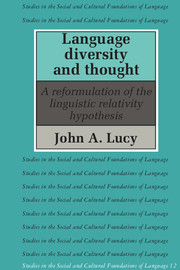Book contents
- Frontmatter
- Contents
- List of figures
- Acknowledgments
- Introduction
- 1 Development of the linguistic relativity hypothesis in America: Boas and Sapir
- 2 Development of the linguistic relativity hypothesis in America: Whorf
- 3 Approaches in anthropological linguistics: typical ethnographic case studies
- 4 Approaches in anthropological linguistics: theoretical and methodological advances
- 5 Approaches in comparative psycholinguistics: experimental studies on the lexical coding of color
- 6 Approaches in comparative psycholinguistics: experimental studies on grammatical categories
- 7 Overview and assessment of previous empirical research
- Notes
- References
- Index
7 - Overview and assessment of previous empirical research
Published online by Cambridge University Press: 05 June 2012
- Frontmatter
- Contents
- List of figures
- Acknowledgments
- Introduction
- 1 Development of the linguistic relativity hypothesis in America: Boas and Sapir
- 2 Development of the linguistic relativity hypothesis in America: Whorf
- 3 Approaches in anthropological linguistics: typical ethnographic case studies
- 4 Approaches in anthropological linguistics: theoretical and methodological advances
- 5 Approaches in comparative psycholinguistics: experimental studies on the lexical coding of color
- 6 Approaches in comparative psycholinguistics: experimental studies on grammatical categories
- 7 Overview and assessment of previous empirical research
- Notes
- References
- Index
Summary
This chapter sets the stage for future empirical work on the linguistic relativity hypothesis. First, the various lines of research reviewed in the first six chapters are briefly characterized as to their overall orientation and most significant problems and contributions. Second, in light of this past research, an evaluation is made of the most promising available approaches and research directions. This evaluation provides the rationale for the design of the specific empirical investigation described in Grammatical categories and cognition.
Overview of past empirical research
Whorf's research served as the historical point of departure for our review, since most contemporary empirical research on the linguistic relativity hypothesis has been stimulated by it. His work can also serve as the substantive point of departure, since it still represents the most adequate empirical approach to the issue among the studies reviewed. Subsequent research efforts have characteristically omitted or altered crucial elements of his approach even as they introduced improvements in some areas. Many of these changes stem more from traditional disciplinary preferences than from any substantive necessity.
Boas, Sapir, and Whorf
Boas put forward the basic claim that languages implicitly classify experience in diverse ways for the purposes of speech. Sapir developed these ideas further by suggesting that these language categories, organized as a coherent system, could shape a person's view of reality. Whorf, in turn, clarified the operation and significance of the systematic interrelations among language categories and provided the first empirical evidence of effects on thought.
- Type
- Chapter
- Information
- Language Diversity and ThoughtA Reformulation of the Linguistic Relativity Hypothesis, pp. 257 - 276Publisher: Cambridge University PressPrint publication year: 1992

